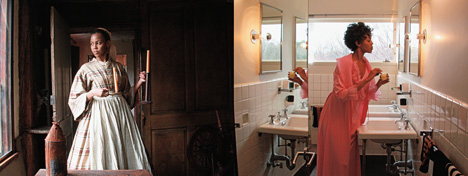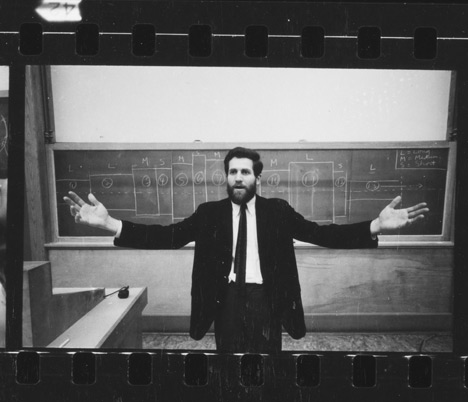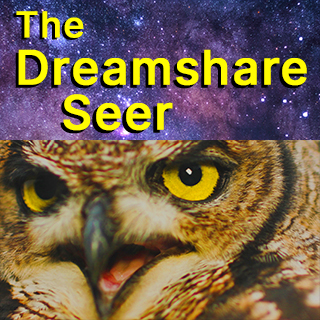Art Monthly 377
June 2014
Lorna Simpson
Interviewed by Alison Green
Art: Teaching the Unteachable
Dave Beech
Art School: Another History
Larne Abse Gogarty
Text Festival
David Briers
Buy Now – select:
Want to read this right now?
Get instant access to the entire back catalogue via Exact Editions from only £8.99!
Contents

Lorna Simpson Corridor 2003
Interview
Mirror Images
Lorna Simpson interviewed by Alison Green
Lorna Simpson's early work took the form of street photography, but soon moved on to text-image combinations and, more recently, moving image. Currently the subject of a retrospective at Baltic in Gateshead, here she discusses the power structures revealed by her works, the human imperatives behind some unusual everyday behaviours, and why wigs were considered such a threat in 1950s Los Angeles that new anti-cross-dressing laws were enacted.
'I think my frustration with documentary photography at the time was how the same tools were used to read each photograph regardless of photographer, regardless of subject, and in some ways I wanted to take away those tools. Thus what viewers expect from a photograph would be slightly circumvented.'

Allan Kaprow explaining his Household happening, Ithaca, New York, 1964
Feature
Teaching the Unteachable
What should art schools teach asks Dave Beech
Art was once synonymous with skill, but artists' own definition of what they do has long since moved away from this. And while the dictum that art is unteachable is a hoary old chestnut, it has now become true in a way not originally intended: the fact is that the technical skills required by artists today are unique to each artist, and therefore beyond any curriculum.
'Art education must face up to the non-specificity of its discipline or it is in danger of reverting to an abstract and fanciful pedagogy of craft.'
Comment
Editorial
'A' is for Assessment
One consequence of the astronomical cost of an art education today is that the pressure for students to 'do well' – whatever their ability or involvement in their course – has been ratcheted up.
'If Jane or Johnny underperform, it won't be the student who is downgraded but the tutor; after all, an art education in London represents a major financial speculation on the part of parent and/or student – more than £65k in some cases.'
Letters
Parents' Evening
Robin Tarbet discusses the situation that has led to one art foundation course introducing a parents' evening in order to manage parents' expectations of art education.
Artnotes
The shadow arts minister has discovered that the country's poorest local councils have implemented the biggest arts funding cuts; a new survey shows that schoolchildren from the poorest families drop art classes at GCSE due to the cost of materials; a neural-imaging experiment shows that art school education changes the structure of the brain; the University of the Arts London agrees to pay the London Living Wage to all its staff; the Paying Artists campaign is launched by a-n; Fruitmarket Gallery U-turns on its offer of unpaid positions; the Barbican Centre and a 'business accelerator' launch an 'incubator' art school for emerging artists; an artist collective pulls its work from the Whitney Biennial in protest over another work in the show; the latest news on galleries, events, appointments, prizes and more.
Obituary
Sturtevant 1924-2014
Reviews
Exhibitions
Chris Marker: A Grin Without a Cat
Whitechapel Gallery, London
Colin Perry
Dean Blunt: Urban
ICA, London
Clifford Owens: Better the Rebel You Know
Cornerhouse, Manchester
Morgan Quaintance
Bill Drummond: The 25 Paintings
Eastside Projects, Birmingham
George Vasey
London Round-up
ICA • Domobaal • Carlos/Ishikawa • Tenderpixel
Martin Herbert
Snow Crash
Banner Repeater, London
opti-ME*
Auto Italia South East, London
Chris Fite-Wassilak
Nottingham and Birmingham Round-up
TG • Ikon • Nottingham Contemporary • Grand Union
Elinor Morgan
Moyra Davey and Phillip Lai
Camden Arts Centre, London
Duncan Wooldridge
Wilhelm Sasnal: Take Me to the Other Side
NOT I: Roza Litwa, Agnieszka Polska and Wojciech Bakowski
Lismore Castle Arts & St Carthage Hall
Klara Kemp-Welch
Solar Lice: Haggard Caravan
The Calder: Hepworth, Wakefield
Bob Dickinson
Ian Kiaer: Tooth House
Henry Moore Institute, Leeds
Martin Holman
Abstract Drawing
Drawing Room, London
Patricia Bickers
Reviews
Artists' Books
Clive Phillpot: Booktrek
Saim Demircan on essays that plot the evolution of artists' books
'Initially regarding them as "odd pamphlets" when they first appeared in the mail from a "standing order" system at Chelsea School of Art Library, Clive Phillpot develops through his writing more acute definitions, distinguishing the terminology of artists' books ("Book Art", "Artists' Books", "Bookworks"). These are oft repeated throughout Booktrek – returned to, re-evaluated, nuanced and argued across texts. Yet Phillpot's persistent argument is one of acknowledging distinctions rather than indiscriminate categorisation.'
Reviews
Books
Documenting the Art Schools
David Barrett on Paul Winstanley's Art School and John Beck and Matthew Cornford's The Art School and the Culture Shed
'It used to be that, even into the 1980s, most towns in the UK had an art school; there used to be 180 art schools back when there were only 28 universities. But the academicisation of further education has reversed these numbers: there are now about 119 universities and only around 11 specialist art and design institutions. Art education is no longer a space of difference but of academic equivalence.'
Reviews
Film
Oberhausen: Memories Can't Wait – Film Without Film
Adam Pugh attends the art-focused short film festival
'In notable contrast to last year's somewhat hermetic theme of "Flatness", and perhaps by way of an antidote, "Memories Can't Wait" was curated by an artist, Mika Taanila: a shrewd move as a sense of openness characterised programming which might otherwise have been desiccated or overwrought.'
Reports
Text Festival
The Language of Lists
David Briers visits Bury's unique international festival
'Every few years a curatorial geomagnetic storm erupts on the fringe of Greater Manchester. The Text Festival in Bury is not one of those mainstream literature festivals that proliferate anywhere that has an arts centre, a public library and a bookshop these days. It is an art-led initiative that asks the question "how can poets and text artists work with language now?", and it came seemingly from nowhere in 2005, taking place within a small Victorian civic art gallery.'
Reports
Conference
Art School: Another History
Larne Abse Gogarty hears a feminist history of art education
'It seems vital that this event shifted the discussion of art education out of its ever-tightening web of doom about the corporatisation of higher education. In order to think through how we improve the various stabs at the production of "alternative" spaces, Catherine Elwes, Amy Tobin and Lisa Tickner's affirmation that some of the most exciting networks and spaces of the past emerged directly out of feminist politics – and not art schools as such – seems an important rejoinder.'
Reports
Letter from Malmö
Nordicness
Nathaniel Budzinski visits the Swedish city that looks southwards
'Malmö Konstmuseum director Cecilia Widenheim is in charge of keeping an archive of over 40,000 artworks, with a remit to collect Nordic art – an increasingly vague notion in a city like Malmö that has had large waves of immigration from the 1970s onwards, plus, Widenheim says, "maybe to grab the real 'Nordicness' you need to go to Berlin".'
Artlaw
Copyright
Changes to Permitted Uses
Henry Lydiate on the shake-up in UK copyright law
'Changes to copyright law came into force in the UK on 1 June 2014, implementing policies developed by the EU aimed at facilitating use of creative works in the post-digital age.'
Listings
Events
London Art Calendar
The updated London events calendar can also be viewed online.
Exhibitions
Exhibition Listings
Art Monthly's exhibition listings can also be viewed online.









